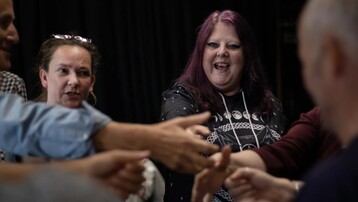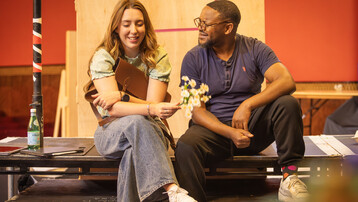News Story

A few weeks ago, we sat down with marketing teams from our touring venues for a Q&A session with our creative team. Here is a glimpse into the insight they gave, discussing the creative process of bringing Handel’s operas to life.
James Conway – ETO's Artistic Director, Director of Tamerlano and Original Director for Ottone and Agrippina,
Bradley Travis – ETO's Head of Learning and Participation and Revival Director for Agrippina
Christopher Moon Little - Revival Director for Ottone
Jonathan Peter Kenny - Conductor for Tamerlano
Gerry Cornelius - ETO’s Music Director and Conductor for Ottone
This Q&A session has been edited for concision and clarity.
So, Bradley, tell us about Agrippina...
Bradley Travis: So, Agrippina! I think the amazing thing about Agrippina is it feels very modern even now. What I say to people is that it's got very high drama. So, it's sort of like, I mean making it very modern, It's almost like Succession or Game of Thrones or something like that. But what it also has is a real element of threat, because if any of the characters, do anything wrong in this world, and in this ancient Roman world, then they could be killed.
But then it's got an extraordinary script, so the libretto is extraordinary, but it's also very funny. So, you've got this really high drama, and then there are some moments of comedy. And it's only funny because we learn the fact that it's quite high stakes.
And the other thing about it, as with all of the operas, but with Agrippina particularly, is that the music is quite extraordinary, and pushes the story forward in quite amazing ways in that the characters each get their sort of moment to shine. But then in Agrippina, there are a lot of moments where characters come together to sing. So there are quite a lot of ensemble moments, and there are a lot of characters in Agrippina. This intrigue really weaves in and out. And so, I think it's a really great opera for people who haven't seen an opera, because pace-wise, it's really fast and the story is very, very relatable, I think.
Chris, what about Ottone?
Christopher Moon-Little:Ottone is also in English. And the good thing about Ottone is it’s kind of the alternative choice, I think, out of the three, because it has this amazingly beautiful set and costumes, and it feels like a dreamy jewel box world. So, if we're going to compare to modern TV shows, as we seem to be doing, the closest thing would be something like Netflix's The Sandman, because it has that strange, slightly unsettled dream feel all the way through it. Out of the three pieces, it's the one set probably closest to modern times because it's around 1000AD. But it is a piece that’s not necessarily, I'd say, so much for modern times, but it's for people who really want to see something delicate, kind of just intriguing, that brings you in and requires you just to connect the dots and fully understand what's going on.
Jonathan, tell us about Tamerlano...
Jonathan Peter Kenny: Actually, Bradley took the words out of my mouth, because I was going to say that I think our show, whilst theirs is the comic version, ours is the deadly serious, blood and guts and torture version. Everything is a matter of life and death. Someone has come in and has completely destroyed the old orders and it doesn't have that sort of medieval violent feel. Ours is in Italian with fantastic surtitling. I think the language is not any kind of obstacle. I think it is the closest to a big play, a big, massive drama. It's very intense.
James Conway: I think it’s most like a French Drama.
JPK: But, so, where we are, they [Ottone and Agrippina] are the other comic version of that same massive intensity.
JC: There's some really good family relations to explore in all three of them. That's a big thing between them; in Ottone, there’s a mother/son relationship that is so weak and strange and twisted, and yet sympathetic. And then in Tamerlano, it’s the father/daughter relationship examined with a kind of psychological faithfulness. I haven't seen this in other drama, really, apart from Shakespeare. Moreau, perhaps. And then there's another weird mother/son relationship in Agrippina. So, family relations go through the three of them.
I really feel that ETO has been a case for playwrights of composers who have worked in this country. So, this was a great time. This was the only time in the history of opera, the history of Europe, in which England was the centre of opera and it was esteemed as the place where the best opera was being made. I would say also that what people don't really often know is that Handel was such a dramatist. Yes, he wrote amazing music, and great tunes, for sure. All really good tunes. But he's a fantastic dramatist. How much trouble he took over each one of them to rewrite and rewrite and rewrite until it was the shape he wanted. And even all subsequent revivals to rewrite, eliminate some parts that he didn't think were quite right anymore. You know, he was a real thinking stage man.
JPK: There’s a real citing of dramatic truth.
Gerry Cornelius: Following on from that, I mean it was, is, so creative. When you look on paper and you see, OK, there’s 25 arias that are on the chart, with kind of recitatives [the speech-like parts of an opera that drives the plot] in between, that convention of having the drama we've done in the recitative, and then the aria, and the character exits. The versatility with which he employs that means that there's a sort of slow-motion process going on as well. This idea of the whole evening, the way he builds the music. Sometimes you'll have one instrument in the orchestra or a couple of instruments right at the end of an act, and it's the most sensational thing you've ever heard because some of the music changes. Handel is a master. That's drama, not just music. James is right. Being able to skillfully manipulate the audience, and three hundred and something years later, it still is absolutely as powerful as it was back then, I think.
So, I think all three pieces, the music is ravishing, just ravishing. I didn't know before coming to the company and I'm astonished. In fact, every time I go and see another Handel opera, I'm astonished by the music. I'm just thinking "how have I lived not knowing this music?", you know. So, I think for the audience that's a real strength, because you’re sort of daring people in a way to not get slightly addicted, and the visuals and the music are really wonderful.
BT: And they are so different from one another. I think that that's a real pull for those audience members that might be coming to all three because I think that Agrippina is very much a young man's opera - he wrote it when he was 24. And then Ottone is sort of middle period in England, and then Tamerlano is towards the end, a masterpiece, so there's a real span of both story and sort of musical style that actually changes quite a lot.
JPK: People think they know Handel and they think of the Messiah. And it's a very different musical world to that. Handel had 42 operas, of which 39 still exist. It's a staggering number. Amazingly high quality, they are really extraordinary, and these three are really different.
Tickets and more information about Handelfest can be foundhere.


